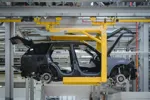By Professor Jim Saker
More than 100 years ago, F.W. Taylor introduced the concept of ‘scientific management’. He believed that in the same way there was a best machine for each job, so there was also a best working method by which people should undertake their roles.
 |
||
|
Professor Jim Saker is director of the Centre for Automotive Management at Loughborough University’s Business School. He has been involved in the automotive industry for more than 20 years. |
||
Taylor, an American mechanical engineer, suggested the “awkward, inefficient or ill-directed movements of men” were a national loss and that by analysing discrete tasks and using the scientific method it was possible to find ‘one best way’ to perform each activity.
In reality, this involved monitoring the actions of staff and introducing time-and-motion studies that could be used to direct and control not only machines, but also people. Our industry is inextricably linked to this approach.
Henry Ford is said to have taken these principles and applied them at the Rouge Plant in Detroit. ‘Fordism’ took the idea of time and motion one stage further by not only identifying the best machines and people, but by bringing the work to the worker with the introduction of the production line. This set the norm for the mass production of cars and to a large extent the car industry as we now know it.
Why is this relevant today? Car production lines have always involved treating people almost as if they were part of the machinery. They have to work at the speed of the line and their tasks are broken down into small, deskilled activities.
When ‘Taylorism’ was introduced into some American companies, there was an uprising of the workers and numerous strikes. The idea of having highly supervised work processes, with people undertaking repetitive monotonous tasks, has been seen by many as dehumanising and from any Marxist perspective would be regarded as the exploitation of the working class by a capitalist elite.
Should car dealers adopt the Amazon model?
This issue has raised its head recently in the news with the reaction to alleged working practices in some of Amazon’s warehouses. Channel 4 investigated Amazon last year and reported that staff were made to work long hours with minimal breaks. The staff claimed their movements were monitored by GPS trackers and said they only got 30 minutes for lunch in a 10-hour shift. Amazon allegedly issued penalty points to workers for talking to colleagues, taking sick leave or even spending too long in the toilet on a ‘three strikes and you’re out’ basis. This coincided with reports of the amount of tax paid by Amazon in the UK being less than the grants they were receiving.

















Alan Murrells (Taybray Ltd Recruitment) - 11/07/2014 06:21
I have recruited and managed dozens of people over the last few decades and have consistently found that hiring people with a positive attitude and then giving them as much freedom to do the job as you can is the route to high productivity and profit, and satisfied staff and customers. Supervision should always be minimal to provide only absolutely necessary direction and occasional corrective action. More important is to show interest in what they've done and positive feedback. They won't do what you would have done or do it in the way you would have done it in almost all cases, but the end result will be much better all round and they will stay loyal to you.